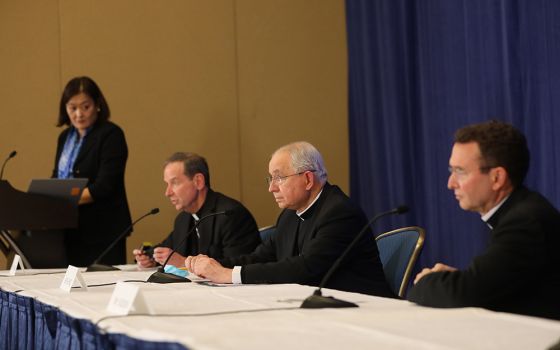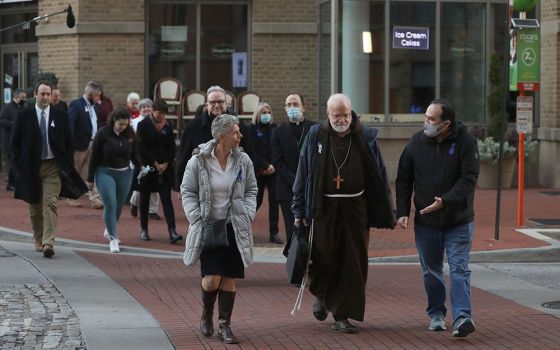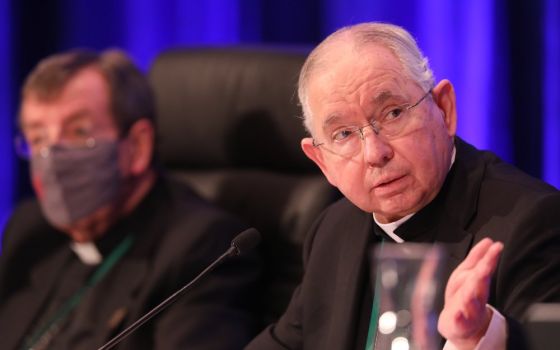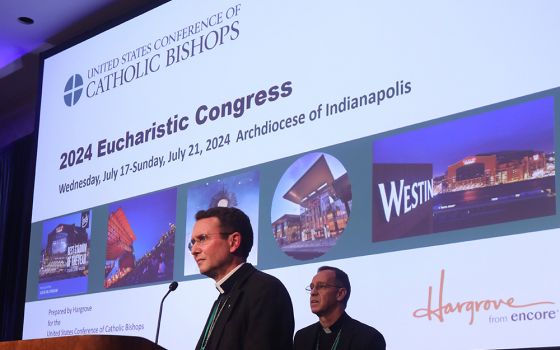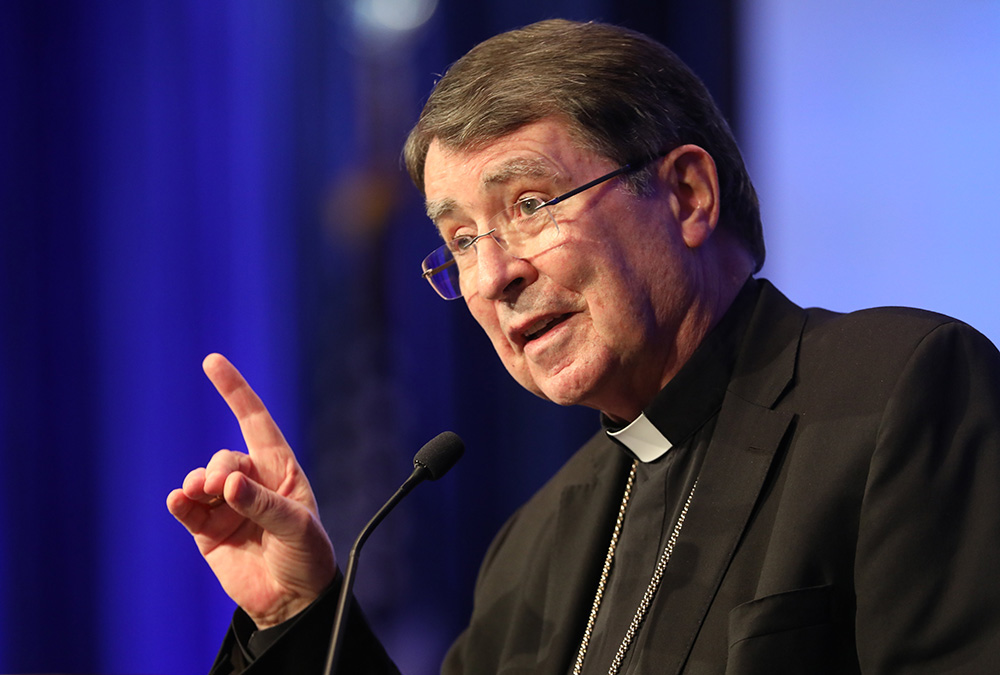
Archbishop Christophe Pierre, apostolic nuncio to the United States, speaks Nov. 16 during a session of the bishops' fall general assembly in Baltimore. (CNS/Bob Roller)
The Vatican's ambassador to the U.S. urged the country's Catholic bishops on Nov. 16 to try to tamp down divisions among themselves and to embrace Pope Francis' vision for a listening church, open to change.
In an energetic half-hour address opening the first general session of the bishops' four-day assembly, Archbishop Christophe Pierre told the prelates gathered here that the church needs "attentive listening more than ever if she is to overcome the polarization facing this country."
Although Pierre did not specifically mention the bishops' plans to release a controversial document on Communion, he appeared to touch on the intense disagreements among the prelates in recent months about the text.
The archbishop called on the bishops to prioritize unity and put aside their preconceived ideas in order to be open to the movement of the Holy Spirit.
In an apparent nod to original plans for the Communion text to single out pro-choice Catholic politicians like President Joe Biden, Pierre said: "There is a temptation to treat the Eucharist as something to be offered to the privileged few."
While saying that the church must be "unapologetically pro-life," Pierre eschewed framing the issue of abortion as part of the culture war.
A synodal approach to engaging abortion, Pierre said, would seek "to understand better why people seek to end pregnancies" and to discern "the root causes of choices against life and what are the factors that make those choices so complicated for some."
Abortion had provided the subtext to an at-times contentious debate during the bishops' last general assembly, held virtually in June. During that event, conservative bishops argued that there was a need to address the so-called "scandal" of pro-choice Catholic politicians like Biden and House Speaker Nancy Pelosi receiving the Eucharist.
Other bishops warned that their push to prohibit the Eucharist with a new document on the matter threatened to politicize the sacrament and further divide the conference.
Advertisement
Massimo Faggioli, a theology professor and church historian at Villanova University, told NCR that the discussions last June "made clear that what is at stake here is the catholicity of the Catholic Church — Catholic in the sense of nonsectarian and nonpartisan."
"What is at stake is nothing less than the sacramental nature of the Catholic Church," Faggioli said. "It is the real threat under the other threats, and something the bishops should be more aware of."
At their June 16-18 meeting, the U.S. bishops voted 168-55, with six abstentions, to ask the doctrine committee to write the document on "eucharistic consistency."
The first draft of that document, leaked last week to some Catholic outlets, does not specifically mention Biden, nor other Catholic politicians. The draft carries the formal title "The Mystery of the Eucharist in the Life of the Church."
In contrast to the bishops' at-times hours-long contentious debate during their June assembly, the formal presentation of the Communion text in the afternoon of Nov. 16 lacked any open rancor.
It featured compliments and friendly suggestions from a small handful of bishops who advised making the document accessible to younger audiences. The discussion was over in less than 20 minutes.
Fort Wayne-South Bend, Indiana Bishop Kevin Rhoades, chairman of the bishops' doctrine committee, said the document is "addressed to all Catholics in the United States," and that it "endeavors to address the centrality of the Eucharist."
"This teaching document addresses fundamental doctrines about the Eucharist that the church needs to retrieve and revive," said Rhoades, who added that his committee in recent months received more than 100 pages of comments and feedback from regional gatherings of bishops.
Bishops will be able to propose amendments to the text throughout the afternoon of Nov. 16. They are expected to vote on the document on Nov. 17.
The bishops have also been discussing the text in executive sessions, which are held behind closed doors. One of those sessions took place on Nov. 15, another in the morning of Nov. 16, and a third in the afternoon of Nov. 16.
Nicholas Cafardi, a civil and canon lawyer, told NCR by email that the bishops have "tripped over themselves" in drafting a document that he said could have just been a slight update to the conference's 2006 letter on the Eucharist, "Happy Are Those Who Are Called to His Supper."
"Instead, we have had this highly politicized process that has emphasized the divisions among our bishops to the detriment of all," Cafardi said. "It has revealed them as too fragmented to work together as a group, lacking either the will or the skill to manifest the unity of the Body of Christ."
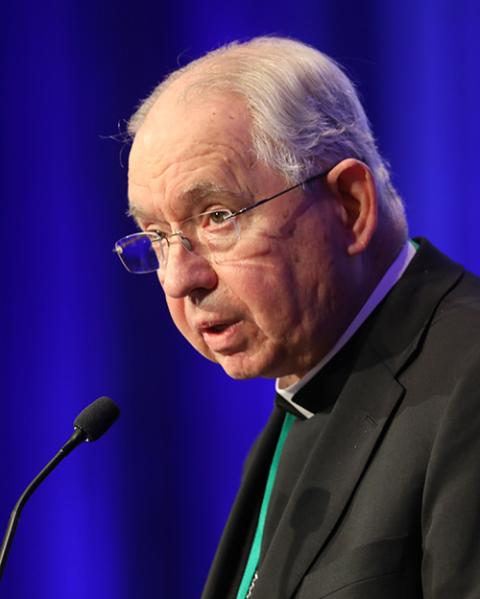
Los Angeles Archbishop José Gomez, president of the U.S. Conference of Catholic Bishops, gives his presidential address Nov. 16 during a session of the bishops' fall general assembly in Baltimore. (CNS/Bob Roller)
The Communion document originally grew out of a special working group that Los Angeles Archbishop José Gomez, the bishops' conference president, created after Biden's election last November.
In his own remarks on Nov. 16, Gomez called the text "absolutely essential" to the bishops' ministry in the U.S. He framed their main task as fighting secularization in the country.
"Many of our neighbors are searching," said the conference president. "They are looking for a new story ... to tell them what they are living for and why."
Gomez's address to the bishops echoed similar themes that he had emphasized in a controversial Nov. 4 speech to a Catholic audience in Spain, where he denigrated modern social justice movements as "pseudo-religions."
Gomez suggested to the bishops that "the American narrative" of freedom, human dignity and equality "is breaking down," adding: "This is the consequence of living in a secularized society."
Several leading Catholic theologians, scholars and activists have criticized Gomez's earlier speech, noting that Francis himself has defended popular movements such as Black Lives Matter and that many Catholics are involved in anti-racism advocacy and other social justice efforts.
Thousands of Catholics have also signed onto a petition asking Gomez to formally apologize for the earlier remarks.
The U.S. bishops also heard on Nov. 16 from Mark Sadd, the chair of their National Advisory Council, a group that includes laity, priests and religious and offers guidance to the bishops' conference's leadership. Sadd passed on comments from the council on various topics, including the proposed draft of the Communion text.
One of the members, Sadd recounted, had said that the Eucharist "cannot be a tool for division." Another member, however, had said the bishops appeared to be "sidestepping their responsibility" in terms of addressing pro-choice Catholic politicians.
Later in the afternoon on Nov. 16, the bishops voted to elect Metuchen, N.J., Bishop James Checchio as their treasurer-elect. Checchio, a former rector of the Pontifical North American College, won by a vote of 135-106 over Seattle Archbishop Paul Etienne. He is now set to become treasurer of the bishops' conference at the end of their November 2022 assembly.
In other votes, the bishops elected Auxiliary Bishop Robert Barron of Los Angeles as chairman-elect of the Committee on Laity, Marriage, Family Life, and Youth; Bishop Earl Boyea of Lansing, Michigan, as chairman-elect of the Committee on Clergy, Consecrated Life and Vocations; Bishop Mark Seitz of El Paso, Texas, as chairman-elect of the Committee on Migration; and Metropolitan Archbishop Borys Gudziak of the Ukrainian Catholic Archeparchy of Philadelphia as chairman-elect of the Committee on Domestic Justice and Human Development.
The closest election of the day was a 121-120 vote for Bishop Steven Lopes to become chairman-elect of the Committee on Divine Worship. Lopes, who leads the U.S. structure for Anglicans joining the Catholic Church, won over St. Louis Archbishop Mitchell Rozanski.
Earlier in the day, the bishops voted to elect Fr. Michael Fuller, a priest of the Diocese of Rockford, Ill., as their new general secretary. Fuller, who will serve a five-year term, replaces Msgr. Jeffrey Burrill, who resigned from the post in July following unsubstantiated media reports of improper behavior.
[NCR news editor Joshua J. McElwee contributed to this report.]
Editor's Note: This story was updated after initial publication to include more information about the formal presentation of the document on Communion and the results of the conference's elections for treasurer-elect and committee chairmen-elect.





